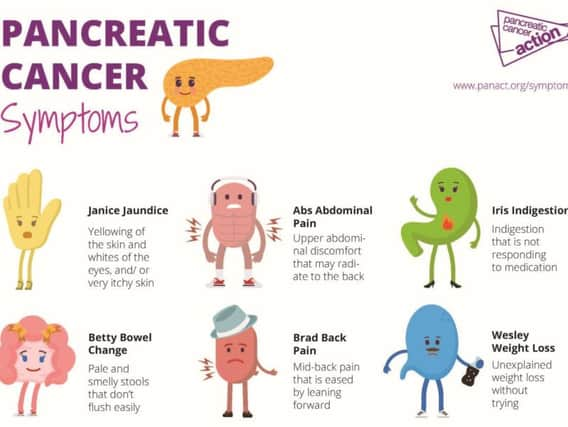Wigan residents should learn symptoms of pancreatic cancer as worryingly low knowledge levels of disease are revealed


According to a survey by Pancreatic Cancer Action, the UK public has a worryingly low knowledge of the pancreas and pancreatic cancer, with 69 per cent knowing nothing about the disease and 74 per cent not being able to name a single symptom.
Advertisement
Hide AdAdvertisement
Hide AdAround two-thirds of people could not name any of the factors that increase the chances of getting the disease.
Pancreatic cancer affects almost 10,000 people a year and men and women are affected equally, with 40 per cent of those diagnosed under the age of 69.
It is the UK’s fifth biggest cancer killer and people are five times more likely to die of the disease than in a car accident.
The pancreas is responsible for producing enzymes that help break down food and hormones which control blood sugar levels.
Advertisement
Hide AdAdvertisement
Hide AdPancreatic cancer occurs when a tumour forms in the pancreas and currently there is no early detection test.
If a patient is diagnosed early and able to have surgery, five-year survival increases from less than seven per cent to around 30 per cent.
Knowing the symptoms and risk factors associated with pancreatic cancer can help increase early diagnosis and save lives.
Dr Liam Hosie, cancer lead for NHS Wigan Borough CCG, said: “Pancreatic cancer doesn’t have many very obvious symptoms, which can make it really hard for people to realise they are ill.
Advertisement
Hide AdAdvertisement
Hide Ad“The most common symptoms are pain in the back or stomach area (which can come and go), unexpected weight loss, yellowing of the skin and whites of the eyes and itchy skin. If you have this collection of symptoms, it is important to get checked out by your GP.
“In most cases, it won’t be anything serious, but treatment is far more successful if the cancer is diagnosed early, so better to get checked out.”
Ali Stunt, founder and CEO of Pancreatic Cancer Action, was diagnosed with the disease when she was 41 and with two young children.
Her illness was detected early enough for her to have surgery and she has now celebrated being a 12-year survivor.
Advertisement
Hide AdAdvertisement
Hide AdShe said: “The results from the survey are worrying as it shows that people are not aware of the signs and symptoms of pancreatic cancer and the potential risk to them.
“Knowing what to look out for when something is wrong with your pancreas is vital for early diagnosis as there is currently no screening test for pancreatic cancer.
“Despite the fact that the disease is set to overtake breast cancer as the fourth biggest cancer killer in the UK, pancreatic cancer only receives three per cent of research funding.
“What’s more the target of 75 per cent of cancer diagnosed in the early stages, set out in the NHS Long Term plan, is unrealistic for pancreatic cancer and presents a challenge that cannot be met.
Advertisement
Hide AdAdvertisement
Hide Ad“We need a specific focus for cancers like pancreatic cancer, which have vague symptoms, as well as an increase in research funding and greater symptom awareness amongst the public and healthcare professionals.
“I am living proof that with early diagnosis, surviving pancreatic cancer is possible.”
Pancreatic Cancer Action is urging the public to be more aware of the symptoms as part of Pancreatic Cancer Awareness Month this November, when more than 80 organisations from 30 countries come together to highlight one of the world’s deadliest cancers.
People should see their GP if they experience one or more of the following: upper abdominal pain or discomfort, mid-back pain, persistent indigestion that does not go away with medication, unexplained weight loss, pale and smelly stools, and yellowing of the skin and whites of the eyes, known as jaundice. If you notice this symptom, you should seek urgent medical assistance.
To find out more about the disease, go to www.panact.org/symptoms